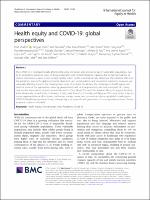Browsing by Author "Hanvoravongchai, Piya"
Now showing items 1-4 of 4
-
Health equity and COVID-19: global perspectives
Shadmi, Efrat; Chen, Yingyao; Dourado, Inês; Faran-Perach, Inbal; Furler, John; Hangoma, Peter; Hanvoravongchai, Piya; Obando, Claudia; Petrosyan, Varduhi; Rao, Krishna D.; Ruano, Ana Lorena; Shi, Leiyu; de Souza, Luis Eugenio; Spitzer-Shohat, Sivan; Sturgiss, Elizabeth; Suphanchaimat, Rapeepong; Uribe, Manuela Villar; Willems, Sara (2020-12)
The COVID-19 is disproportionally affecting the poor, minorities and a broad range of vulnerable populations, due to its inequitable spread in areas of dense population and limited mitigation capacity due to high prevalence of chronic conditions or poor access to high quality public health and medical care. Moreover, the collateral effects of the pandemic due to the global economic downturn, and social isolation and movement restriction measures, are unequally affecting those in the lowest power strata of societies. To address the challenges to ... -
Health financing policies during the COVID-19 pandemic and implications for universal health care: a case study of 15 countries
Foo, Chuan De; Verma, Monica; Tan, Si Ying; Hamer, Jess; Mark, Nina van der; Pholpark, Aungsumalee; Hanvoravongchai, Piya; Cheh, Paul Li Jen; Marthias, Tiara; Mahendradhata, Yodi; Putri, Likke Prawidya; Hafidz, Firdaus; Giang, Kim Bao; Khuc, Thi Hong Hanh; Minh, Hoang Van; Wu, Shishi; Caamal-Olvera, Cinthya G; Orive, Gorka; Wang, Hong; Nachuk, Stefan; Lim, Jeremy; Cruz, Valeria de Oliveira; Yates, Rob; Legido-Quigley, Helena (2023-12)
Background: The COVID-19 pandemic was a health emergency requiring rapid fiscal resource mobilisation to support national responses. The use of effective health financing mechanisms and policies, or lack thereof, affected the impact of the pandemic on the population, particularly vulnerable groups and individuals. We provide an overview and illustrative examples of health financing policies adopted in 15 countries during the pandemic, develop a framework for resilient health financing, and use this pandemic to argue a case to move towards ... -
Mitigating the impacts of the COVID-19 pandemic on vulnerable populations: Lessons for improving health and social equity
Tan, Si Ying; Foo, Chuan De; Verma, Monica; Hanvoravongchai, Piya; Cheh, Paul Li Jen; Pholpark, Aungsumalee; Marthias, Tiara; Hafidz, Firdaus; Putri, Likke Prawidya; Mahendradhata, Yodi; Giang, Kim Bao; Nachuk, Stefan; Wang, Hong; Lim, Jeremy; Legido-Quigley, Helena (2023-06-02)
The COVID-19 pandemic had an inequitable and disproportionate impact on vulnerable populations, reversing decades of progress toward healthy populations and poverty alleviation. This study examines various programmatic tools and policy measures used by governments to support vulnerable populations during the pandemic. A comparative case study of 15 countries representing all World Health Organization's regions offers a comprehensive picture of countries with varying income statuses, health system arrangements and COVID-19 public health measures. ... -
Progress toward universal health coverage in ASEAN
Minh, Hoang Van; Pocock, Nicola Suyin; Chaiyakunapruk, Nathorn; Chhea, Chhorvann; Duc, Ha Anh; Hanvoravongchai, Piya; Lim, Jeremy; Lucero-Prisno, Don Eliseo III; Ng, Nawi; Phaholyothin, Natalie; Phonvisay, Alay; Soe, Kyaw Min; Sychareun, Vanphanom (2014-12-03)
Background: The Association of Southeast Asian Nations (ASEAN) is characterized by much diversity in terms of geography, society, economic development, and health outcomes. The health systems as well as healthcare structure and provisions vary considerably. Consequently, the progress toward Universal Health Coverage (UHC) in these countries also varies. This paper aims to describe the progress toward UHC in the ASEAN countries and discuss how regional integration could influence UHC. Design: Data reported in this paper were obtained from ...




